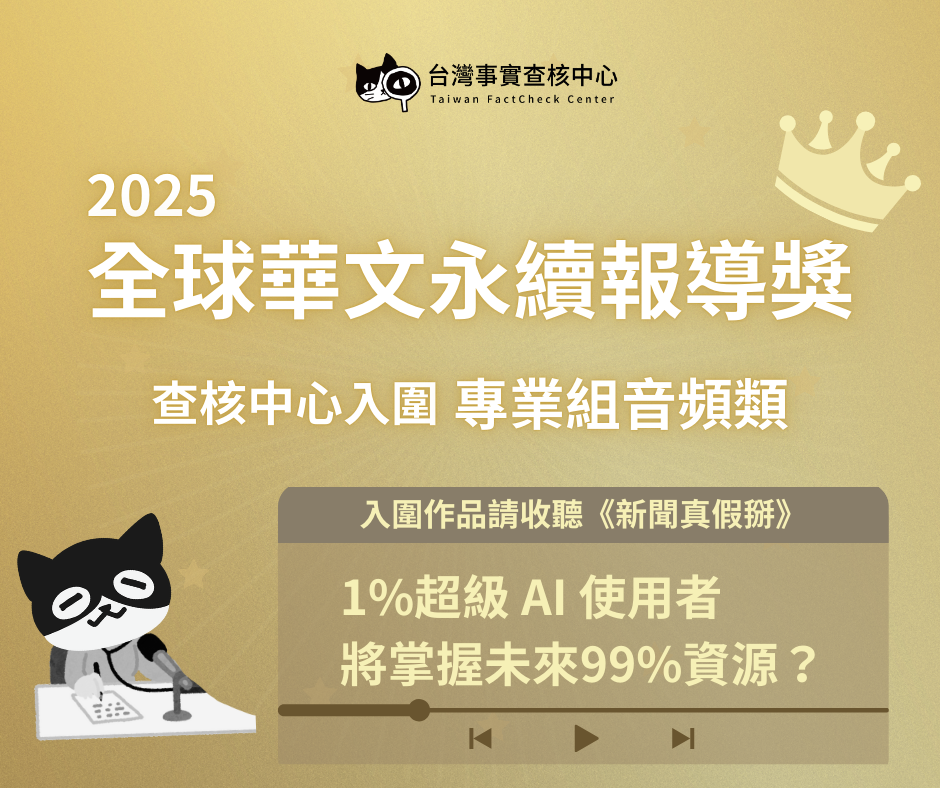TFC workshop discusses challenges brought by AI
TFC workshop discusses challenges brought by AI
A workshop co-organized by the Taiwan FactCheck Center and the Association for Quality Journalism on investigative reporting and fact-checking was held on July 29 and 30 to discuss challenges brought by Artificial Intelligence (AI) to fact-checkers.
Aside from the challenges brought by AI, the two-day workshop also discussed the circulation of false information on social media, the meaning of doing spin control online, and how to stop such practices.
Image: Nearly 100 people from different walks of life interested in investigative journalism, fact-checking, and fake news participated in the two-day investigative reporting and fact-checking workshop. (Photo/ TFC)
Tzen-ping Su, chairman of the Foundation of Excellent Journalism Awards, said during the workshop’s opening that AI-generated images and content are impacting the global information environment, posing severe threats to the practice of fact-checking.
That was why the two-day workshop was organized, allowing experts, academia, and the general public to discuss the latest challenges and how to deal with them, he said.
The workshop also featured speeches made by a number of investigative reporters familiar with the issues, including I-ting Chiang, winner of 2022’s Excellent Journalism Awards’ Investigative Reporting Award, as well as Yang Yu-yun, who was awarded funding from the Foundation of Excellent Journalism Awards, according to the foundation.
Also, for the first time, the annual workshop was divided into smaller groups, allowing participants and lecturers to have more direct contact and in-depth discussions over the issues they were interested in.
Challenges with AI-generated content
Three academia joined the AI challenges to the fact-checking discussion, namely, Tzong-han Tsai, an associate research fellow at the Academia Sinica, and Ling-chieh Kung, an associate professor at National Taiwan University’s Department of Information, and Jih-hsuan Tammy Lin, distinguished professor of the College of Communication at National ChengChi University, all agreed that AI tool such as ChatGPT can create vast amounts of material – words, pictures, sounds and videos – very quickly.
Image: From left: Tzen-ping Su, the panel host and chairman of the Foundation of Excellent Journalism Awards, associate research fellow at the Academia Sinica Tzong-han Tsai, distinguished professor of the College of Communication at National ChengChi University Jih-hsuan Tammy Lin, and associate professor at National Taiwan University’s Department of Information Ling-chieh Kung. (Image/ TFC)
The problem is, that they have no commitment to the truth and can be misused to create news stories that appear to have been written by humans to try to control the way something is described to the public in order to influence what people think about it, they warned.
Therefore, with AI-generated content being widely spread over the internet, it is even more critical for the general public and internet users to check the information they find online with more credible and reliable sources, they said.
Lin said that in the age of AI-generated content, reliable traditional news media and content providers have to take even more responsibility by quoting reliable sources and basing their stories on credible facts.
Algorithm Amplifying Misinformation
Zhe-bin Huang, a veteran journalist and an editorial advisor to Commonwealth Magazine, meanwhile, warned that AI’s powerful algorithm to increase views online could help the spread of misinformation and even promote harmful content to online users, particularly to the youths.
For instance, Huang said the Wall Street Journal recently did its own experiment to see how TikTok’s algorithm can potentially promote this kind of harmful content.
As detailed in the report, the WSJ created over 100 accounts at TikTok, with around 30 of them set for underage users' use only.
However, WSJ later found these minor accounts were being fed with adult-only content such as pornography, drugs, and sex toys, according to Huang.
Image: Zhe-bin Huang, a veteran journalist and an editorial advisor to Commonwealth Magazine(Photo/ Yuan-Bin Zhao)
Meanwhile, Summer Chen, the Editor-in-Chief at Taiwan FactCheck Center (TFC), also warned that algorithms have changed the whole eco-system of rumors spreading online.
Currently, all major online social media platforms, including Facebook, and online discussion boards, PTT and Mobile01, have become home to the spread of misinformation that many users would use to influence what people think about a particular issue, thus affecting voters’ decisions in major elections, Chen said.
For instance, two widely discussed issues in Taiwan recently, namely Japan’s egg prices are much lower than in Taiwan and an online drama on a young woman in northern Taiwan who refused to hold a traditional roadside wedding banquet in southern Taiwan, were first posted on PTT and Mobile01, according to Chen.
Huang reminds these platform users, especially the younger ones who value social justice and hate the spread of fake news, not to be manipulated by rumor-spreaders.
He urged them to leave their own echo chamber from time to time and pursue other sources of information to ensure they would not fall for misinformation campaigns.
On how to stop the co-existence of online platforms with false information, Chang-de Liu, a professor at National ChengChi University’s Department of Journalism, called on the continued promotion of fact-checking practices and work closer with the government and to stop the funding for advertising false information in their platforms.
Platform runners should also reasonably share their profits with credible news content providers so that news media is able to provide credible content with reliable sources to combat the spread of fake news and misinformation, Liu added.
Nearly 100 people from different walks of life who are interested in investigative journalism, fact-checking, and fake news have participated in the two-day workshop.
You can read the Chinese version of this article here.



